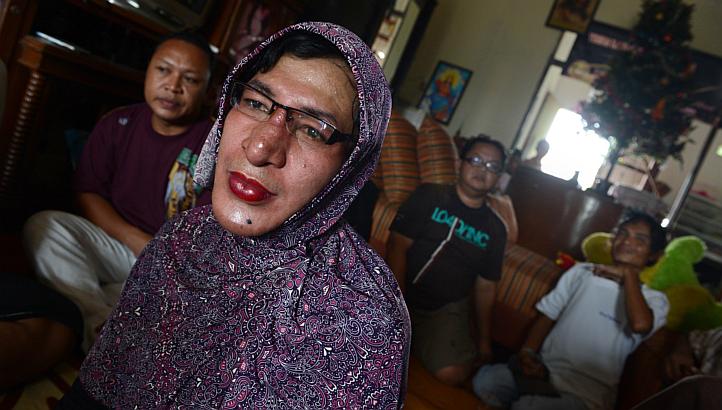A dozen elderly women are gathered inside the pink house, set on a narrow dirt road in a dusty suburb of Jakarta. Together they sew, bake and chat. On first sight they look like a group of benevolent grandmothers, but the sunken cheeks and deep lines on some of their faces tell stories of hardship.
All of these women are “waria”, a term used for Indonesian transgender people, and the house in the country’s capital has been hailed by activists as the first old person’s home for that gender community. It is used to describe a range of gender identities, though it particularly refers to men who feel they are women and is applied regardless of whether they have undergone gender reassignment surgery or hormone therapy.

A home for elderly waria is an unexpected sight but perhaps also typical of the many contradictions in a nation where, until two years ago, the official government line on transgender people was that they were mentally ill. As part of new moves towards acceptance, the government will in March begin supporting the home, which officially opened in November, with a basic nutrition programme while offering business seed money to 200 transgender residents in the city. However, most of the funds needed to support the home will continue to come from its founder, Yulianus Rettoblaut, a waria and prominent activist better-known as Mami Yuli, who turned her own house into the shelter last year.
“We are focusing on elderly waria because NGOs usually focus on young ones,” the 51-year-old told AFP. She was inspired to take action after seeing many of her fellow ageing waria on the streets, ill, unemployed and forced to live in squalid conditions. While a few waria have found domestic celebrity as talk show hosts or emcees, most across Southeast Asia’s biggest nation of 240 million people are cast out by relatives who would otherwise be responsible for the care of their elderly family members. “Life for them is very difficult and many live under the poverty line. They often have no choice but to sleep under bridges,” Mami Yuli said.
An estimated 35,000 Indonesians are transgender, the Asia-Pacific Coalition on Male Sexual Health reports, but activists suspect the figure is much higher. Despite being considered sacred by some Indonesian ethnic groups, waria largely remain a target of harassment and intimidation, although there are signs of increasing acceptance.
Discrimination forces many into sex work, fuelling an increase in HIV rates from six to 34 percent between 1997 and 2007 among transgenders in Jakarta, according to Health Ministry data. Prostitution is illegal in Indonesia and the country’s Islamic clerics say it is “haram” (forbidden). But the industry thrives in Indonesia’s karaoke bars and darker street corners where waria can be found holding up dresses up to show off breasts grown with hormones from birth control pills or silicone injections.
But signs are growing that the future might be a little brighter for this marginalised community. In 2008 the first Islamic school specifically for transgender people to pray and study the Koran opened in 2008 in Yogyakarta. The establishment of Mami Yuli’s home for the elderly is seen as another victory.












Recent Comments